4. Middle East and North Africa
The Middle East and North Africa region is a major supplier of energy resources, and it accounts for approximately 50% of both the world’s oil and natural gas reserves. In addition, Japan depends on this region for more than 80% of its crude oil imports, and the core maritime route for commerce between Japan and Europe pass through the region. Thus, the Middle East is a critical region for Japan’s economy and energy security
The Middle East and North Africa region has experienced major political upheaval since 2011. The democratization process is proceeding in the countries where longstanding regimes collapsed. Encouraging reform efforts in such countries through economic assistance leads to peace and stability not only in those countries and their neighbors, but also in the entire world.
However, this area is facing a number of challenges that destabilize the region, such as the expansion of violent extremist groups including Islamic State of Iraq and the Levant (ISIL), large numbers of refugees, the Syrian crisis, the worsening of the situation in Iraq, the severing of diplomatic relations between Saudi Arabia and Iran, the Middle East Peace Process, and the domestic situation in Afghanistan, Yemen and Libya. In 2014, ISIL unilaterally declared the establishment of a self-proclaimed “state” which extends across national borders in Iraq and Syria, and in response to this the Global Coalition to Counter ISIL led by the United States began aerial bombing in the same year and Russia began aerial bombing in September 2015. The expansion of violent extremists including ISIL has been not only significantly undermining the order in the Middle East region but also posing great concern to the entire global society.
Moreover, it is the feature of this region that there are many countries with large youth populations, and it is important to provide support to these countries so that they can continue to achieve stable growth. Realizing peace and stability in this region facing these kinds of issues is extremely important for the international community as a whole including Japan; therefore the international community is working towards the solution of these issues.
<Japan’s Efforts>
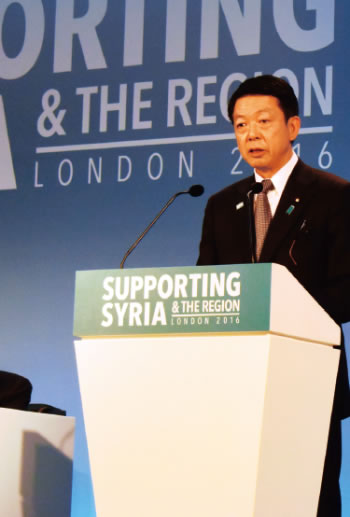
Then State Minister for Foreign Affairs Yoji Muto announces that Japan will extend new assistance of approximately $350 million to Syria, Iraq and neighboring countries at the Supporting Syria and the Region Conference held in London, the United Kingdom in February 2016.
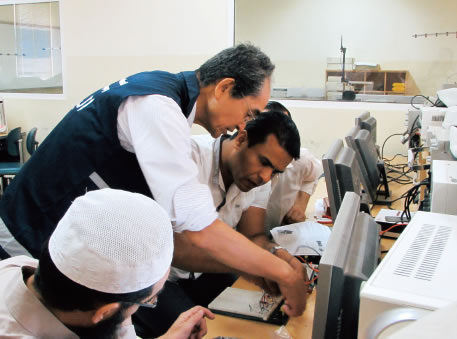
A Senior Volunteer, Mr. Kiyoshi Morioka provides training on personal computer assembly to instructors at a vocational training facility (JOKOTI) in Zarqa, in the central region of Jordan. (Photo: Masato Nakamichi / JICA Jordan)
In the Middle East and North Africa, there are many countries and regions with devastated living and social infrastructure and security problems such as Palestine, Afghanistan and Iraq. Since peace and stability in these countries and regions have a major impact on the stability and prosperity of the region and the international community as a whole, it is important for the international community to continue to work in solidarity to support these countries and regions for the achievement of sustainable peace and stability, nation-building, and national reconstruction. In view of such characteristics of the Middle East and North Africa regions, Japan’s proactive assistance in these regions is of great significance.
Prime Minister Shinzo Abe visited this region five times during the period between December 2012, when the second Abe administration was inaugurated, and January 2015, promoting the fundamental strengthening of Japan-Middle East relations based on the concept of Comprehensive Partnership towards Stability and Prosperity. In February 2015, following the terrorist incident involving the murder of Japanese nationals in Syria, Foreign Minister Fumio Kishida announced the 3-Pillar Foreign Policy in Response to the Terrorist Incident Regarding the Murder of Japanese comprised of: (i) Strengthening counter-terrorism measures; (ii) Enhancing diplomacy towards stability and prosperity in the Middle East; and (iii) Assistance in creating societies resilient to radicalization.
To address the issues in Syria that are matters of concern for the international community, Japan announced additional assistance totaling approximately $350 million at the Supporting Syria and the Region Conference held in London in February 2016. This has brought the total of Japan’s assistance to Syria, Iraq and neighboring countries to more than $1.64 billion since the outbreak of the Syrian crisis in 2011.
Furthermore, at the G7 Ise- Shima Summit in May the same year, Japan declared that under Prime Minister Abe’s philosophy of “The Best Way is to Go in the Middle”, it would provide comprehensive assistance for the stabilization of the Middle East region totaling approximately $6 billion, including capacity building of approximately 20,000 people over the three years from 2016 to 2018, in order to prevent the expansion of violent extremism and build a “tolerant and stable society” in the Middle East region.
Moreover, at the United Nations Summit for Refugees and Migrants in September the same year Prime Minister Abe declared that Japan would implement humanitarian and self-reliance assistance to refugees and migrants, and assistance to host countries and communities of approximately $2.8 billion over the next three years. Furthermore, at the United Nations Security Council High-level Briefing on Syria he declared that Japan would implement approximately $1.13 billion of assistance to Syria, Iraq, and neighboring countries in 2016. Japan will steadily implement this kind of assistance and cooperate with the international community to provide not only humanitarian assistance but also assistance for social stabilization and inclusive growth, such as human resources development utilizing the strengths of Japan from a medium- to long-term perspective.
•Tunisia
Project on Co-management of Coastal Fisheries in the Gulf of Gabes
Technical cooperation project (October 2012 – October 2016)
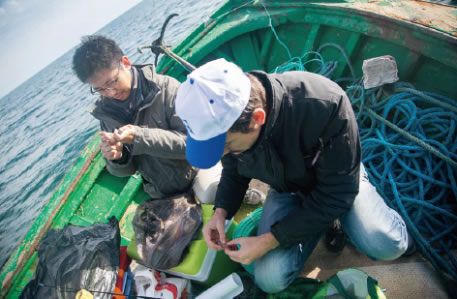
An Expert, Mr. Hitonori Nanao provides instruction to fishermen regarding fishing methods that have low impact to aquatic resources in order to improve the sustainable management of aquatic resources. (Photo: JICA)
In Tunisia fishery resources are not only a source of domestic supply of animal protein but also play an important role as a source of foreign currency earnings through exports, and approximately 53,000 people make their living in the fishing industry. In particular, three governorates in southern Tunisia (Sfax, Gabes, and Medenine) facing the Gulf of Gabes have a population of approximately 33,000 fishermen, equivalent to just over 60% of the nationwide total fishermen population, and the Gulf not only has an importance for the fishing industry of Tunisia but also has important ecosystems supporting the marine resources of the Mediterranean Sea. However, the marine resources have declined due to destruction of habitat environments caused by overfishing and illegal fishing, and in recent years the production volume of the coastal fishing industry has greatly declined.
In order to improve this situation, the Government of Tunisia called for the cooperation of Japan, which has accumulated a wealth of knowledge of the management of fishery resources, and Japan supported fishery resources management in each fishing village over five years from 2005.
However, the coastal fishermen of the Gulf of Gabes were able to freely access the fishing grounds inside the gulf to fish, so the effect of resources management carried out by each individual fishing village was limited, thus more comprehensive fishery resources management was necessary for the entire Gulf of Gabes region. For that reason, Tunisia called on Japan to support the establishment of a Coastal Fishery Resources Management Plan that increased effectiveness by strengthening collaboration among the fishing villages, and the Government of Japan agreed to commence the Project on Co-management of Coastal Fisheries in the Gulf of Gabes from 2012.
Due to the establishment of this plan, a structure for the joint management of coastal fishery resources was guaranteed to be continued in the region covered by the project and the sustainable use of coastal fishery resources became possible throughout the entire Gulf of Gabes region, contributing to stable livelihoods for people who make their living in the fishing industry.

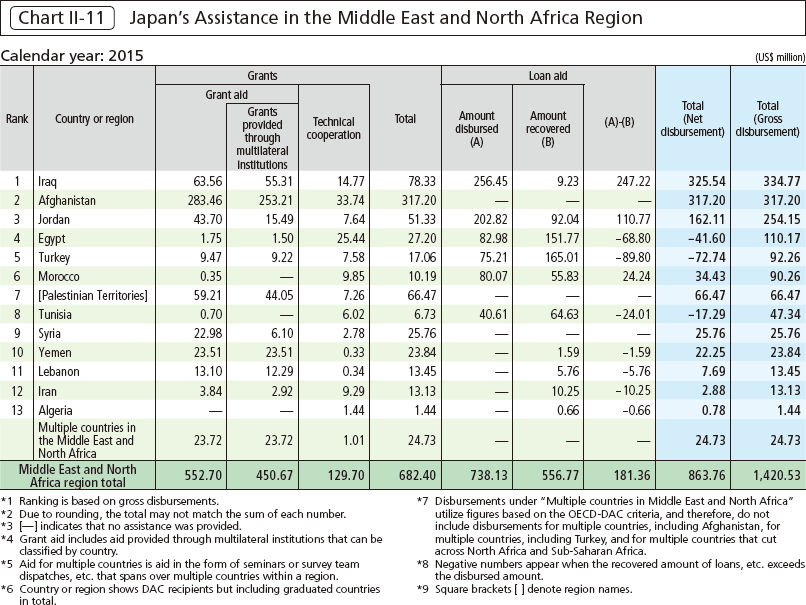
•Iran
The Project for Community-Based Sustainable Development Master Plan of Qeshm Island toward “Eco-Island”
Technical Cooperation for Development Planning (November 2015 – )
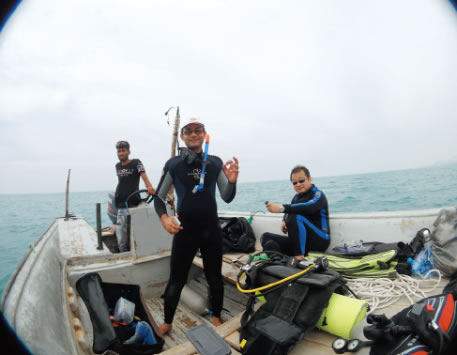
A marine ecosystem survey. These surveys are carried out in cooperation with local members in this project in response to the lack of basic data necessary for formulating a development plan in Iran. (Photo: JICA Project Team)
Qeshm Island in Iran, which is located in the Strait of Hormuz, the gateway to the Persian Gulf, is a geopolitically important island of approximately 1,700 square kilometers, slightly larger than the main island of Okinawa. A part of the island is designated as a special free zone (tax exemption etc.) for heavy industry and tourism and attracts attention as a trading and economic center. Since the nuclear-related economic sanctions on Iran were lifted in January 2016, foreign investors are increasingly interested in the island.
Meanwhile, Qeshm Island remains rich in precious nature, blessed with the largest mangrove forests in the Persian Gulf and a Geopark*1 of distinctive scenery on the island. However, the environment of the island is threatened by oil and gas development and tourism and so on. The Qeshm Island Geopark had formerly been registered as a Global Geopark of UNESCO before its deregistration due to the worsening of the natural environment and the lack of environment conservation systems. Economic disparities on the island are also a problem as the unemployment rate marks 13% and remains relatively high in the country, despite the ongoing industrial development.
Under this situation, the Government of Iran has presented an “Eco-Island” initiative consisting of the three pillars of (i) development of an environment-friendly special economic zone, (ii) conservation of valuable natural resources and traditions, and (iii) reduction of disparities among the local residents. Japan, upon the request from the Government of Iran, commenced technical cooperation for formulating a development project for the island with the objective of improving the livelihood of the residents and of sustainable development that gives consideration to the conservation of nature. Experts in diverse areas such as tourism promotion, fisheries promotion, industrial development, waste management, sewage treatment, promotion of private sector investment and environmental management, visited the island, where they carried out surveys of the existing conditions, and analyses of challenges and needs to formulate a comprehensive and sustainable development plan.
Regarding tourism promotion, one of the priority areas, a JICA project team and the Embassy of Iran in Tokyo co-hosted a tourism seminar in May 2016 which approximately 40 Japanese companies joined to engage in an active exchange of views. Furthermore, Japan plans to invite Japanese travel agencies to the island to help them make programs for Qeshm Island and to encourage investment in the island. It will also actively develop public relations and matching for promoting investment by Japanese companies through holding seminars in the Embassy of Iran in Tokyo. A variety of activities are implemented and planned to ensure that the projects serve as a bridge of the cooperation between Japan and Qeshm Island. (As of August 2016)
- *1 This is a word combining “Geo” which means the Earth or ground and “park”, meaning “a park of the earth,” referring to a place where visitors can learn about and fully enjoy the earth.
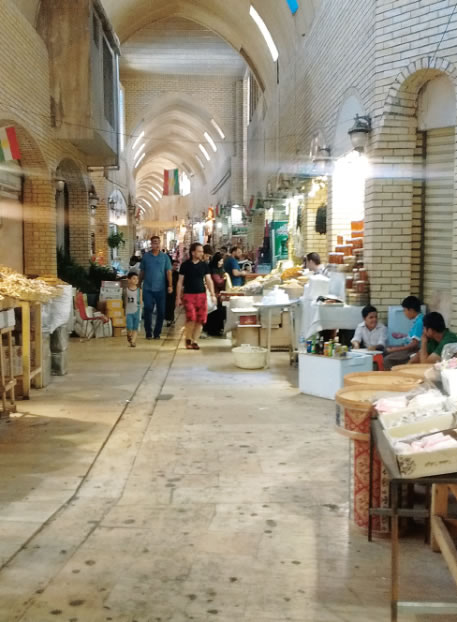
The Kayseri Bazaar in the center of Erbil in Iraq. (Photo: Yuta Aikawa / Embassy of Japan in Iraq)
